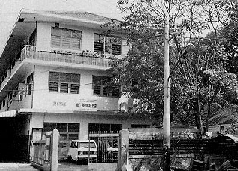 By Kyai Haji Abdurrahman Wahid and C. Holland Taylor
By Kyai Haji Abdurrahman Wahid and C. Holland TaylorThe latest suicide bombings on the resort island of Bali appear to have been carried out by young Indonesian Muslims indoctrinated in an ideology of hatred. Once again the cult of death has proved its ability to recruit misguided fanatics and incite them to violate Islam's most sacred teachings in the very name of God. The only way to break this vicious cycle is by discrediting the perverse ideology that underlies and motivates such brutal acts of terrorism.
Dewa - Ahmad Dhani
One of us, Abdurrahman Wahid, was Indonesia's president when tragic violence inundated the eastern region of Ambon and the Malukus six years ago. A seemingly trivial argument between a Christian bus driver and a Muslim passenger in early 1999 triggered a bloody religious war that eventually claimed 10,000 lives and drove a half-million Christian and Muslim inhabitants from their homes. Radical Muslims from throughout Indonesia flocked to the region to wage jihad on Indonesian Christians, backed by powerful Islamist generals and plenty of money.
The largest such group was Laskar Jihad ("Warriors of Jihad"), led by an Indonesian of Arab descent whose ancestors came from the same province in Yemen as those of Osama bin Laden. Jafar Umar Thalib is a veteran of the Afghan jihad and knows bin Laden personally. Backed by spiteful generals close to the disgraced Suharto regime, Thalib sounded the call to jihad, and thousands of young Muslims flocked to his green banner to slaughter Indonesian Christians in the name of God.
Enjoying powerful clandestine support, Laskar Jihad had actually established a military training camp less than 60 miles from the capital, Jakarta. When national police broke up the camp, Thalib promptly announced that Laskar Jihad would sail for Ambon and wage jihad there. I (Wahid) ordered the army generals in East Java to prevent them from sailing and ordered the navy to intercept them if they did. I also ordered the governor of East Java to guard the docks and prevent Laskar Jihad from boarding. But these presidential orders were ignored by a military that refused to accept civilian control in the newly democratic Indonesia. An unholy alliance of fundamentalist jihadists, Islamist generals and people close to the Suharto family ensured that thousands of Laskar Jihadists poured into Ambon and the Malukus.
Once there, they spread out in the Muslim communities and launched devastating raids on neighboring Christian enclaves, burning and desecrating churches; destroying homes; and slaughtering thousands of men, women and children.
All of Indonesia knew what was happening. It was in the news day and night. Laskar Jihad became a symbol and a byword for the suffering inflicted upon that region. The goal of its clandestine backers -- and those in parliament itself -- was to create chaos and block the reform that desperately needed to occur in the Indonesian government. They succeeded; the process of reform ground to a halt.
Then came the first Bali bombing in 2002, with jihadists incinerating a popular club and more than 200 people, mostly foreign tourists. Although that attack was the work of a different jihadist group, Jemaah Islamiah, it was obvious that the military -- by then in the hands of "red," or nationalist, generals allied to my successor, Megawati Sukarnoputri -- would crack down on all active jihadist groups. Immediately afterward, Thalib announced that Laskar Jihad had served its purpose, and he recalled its warriors to Java. Thousands of battle-hardened jihadists returned to Java's towns and villages to await his further call.
One of the people watching this tragedy unfold was a brilliant young musician named Ahmad Dhani. Leader of the immensely popular rock band Dewa, Dhani began to use his musical platform to influence millions of fans in Indonesia, Singapore and Malaysia to resist the tide of religious extremism.
In response to Laskar Jihad's atrocities, and to discredit the appeal of fundamentalist ideology, Dhani composed the best-selling album "Laskar Cinta" ("Warriors of Love"). Released in November 2004, it quickly rose to the top of the charts as millions of young Indonesians embraced its message of love, peace and tolerance.
Dhani and the other members of Dewa have presented Indonesia's youth with a stark choice, and one easy for the vast majority to answer: Do they want to join the army of jihad, or the army of love? In response, numerous radical Muslim groups have accused Dhani -- who is a devout Sufi, or mystically inclined Muslim -- of being an infidel, an apostate (code words inciting violence) and a Zionist agent. They have hauled him into court on charges of defaming Islam and seek to ban his use of rock music to promote a spiritual and progressive interpretation of Islam that threatens the appeal of their own Wahhabi-inspired extremism.
Yet rather than be intimidated, Dhani recently announced to the Indonesian press his plan to launch another "ideological smart bomb" -- in the form of a song that uses the revelatory tone of the Koran to declare: "Truth dwells in the hearts of those who love and are free of hatred; the hearts of those who hate . . . are possessed by Satan."
Dhani and his group are on the front lines of a global conflict, defending Islam from its fanatical hijackers. In a world all too often marred by hatred and violence committed in the name of religion, they seek to rescue an entire generation from Wahhabi-financed extremists whose goal is to transform Muslim youth into holy warriors and suicide bombers. For every young Indonesian seduced by the ideology of hatred and fanaticism -- including those responsible for the recent, awful attacks in Bali -- countless others see through the extremists' web of lies and hatred, in no small part thanks to the visionary courage of people like Ahmad Dhani. For as they listen to Dewa's music, the hearts of millions of young Indonesians have been inspired to declare: "No to the warriors of jihad! Yes to the warriors of love!"
Kyai Haji Abdurrahman Wahid is a former president of Indonesia. From 1984 to 1999 he headed Nadhlatul Ulama, the world's largest Muslim organization, with nearly 40 million members. C. Holland Taylor is chairman and chief executive of Libforall Foundation, a nonprofit that works to reduce religious extremism and discredit the use of terrorism. Dhani serves on the foundation's board. The authors can be reached at media@libforall.org.

